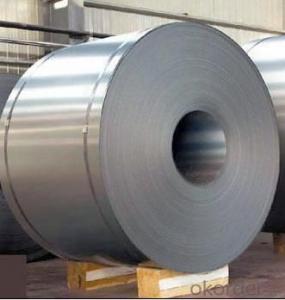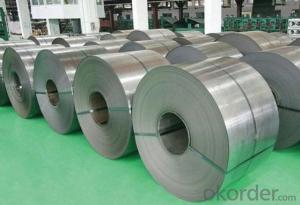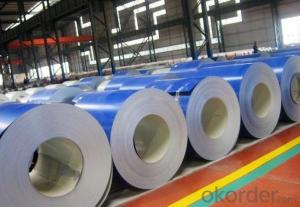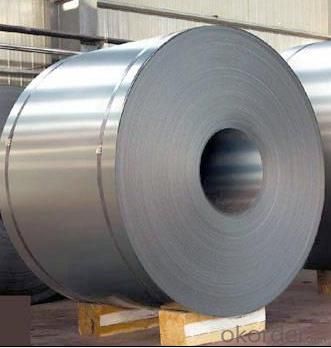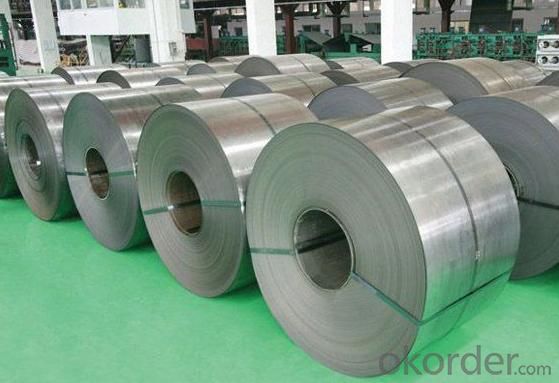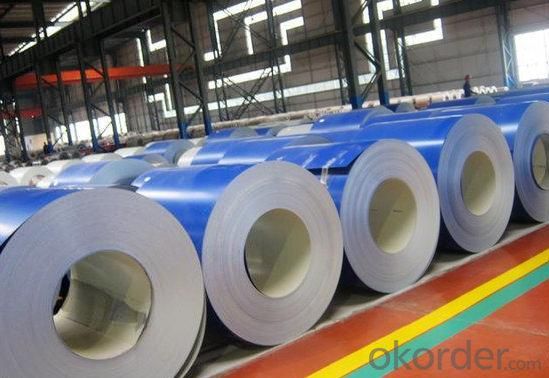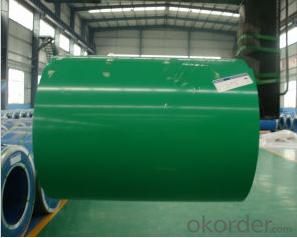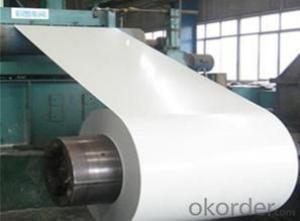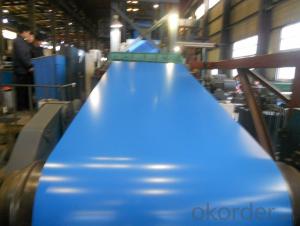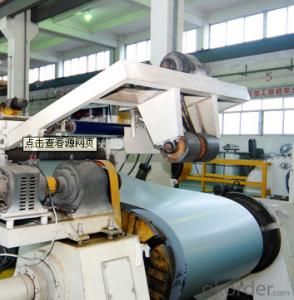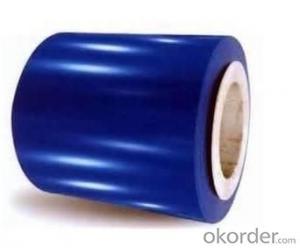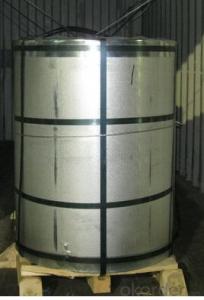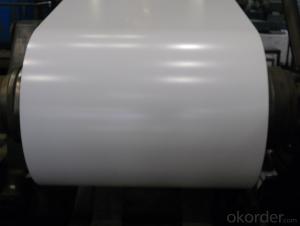Competitive Prepainted Galvanized Steel Coil of Steel Structure Buildings
- Loading Port:
- Shanghai
- Payment Terms:
- TT OR LC
- Min Order Qty:
- 30 m.t.
- Supply Capability:
- 10000 m.t./month
OKorder Service Pledge
OKorder Financial Service
You Might Also Like
Basic Info.
Model NO.:CGCC, SGCC, DX51D, DX51D+Z, TDC51D, TDC51D+Z, G550
Surface Treatment:Coated
Certification:ISO, SGS, BV
Technique:Hot Rolled
Standard:ASTM, JIS, GB, AISI, DIN, BS
Application:Building Material, Steel Structure Buildings
Edge:Mill
Stock:Stock
Steel Grade:Q195
Thickness:0.12-1.5mm
Width:600-1500mm
Zinc Coating:30g-275G/M2
Color:as Ral or Sample
Paint Thickness:Top 15-25um+Back 8-10um
Painting Type:PE, PVDF, Smp, Hdp, as Requested
Delivery Day:15-30 Days
Production Ability:30000mt/Month
Coil Weight:3-5 Ton
Export Markets:Global
Additional Info.
Packing:Sthandar Seaworthy Package
Standard:JIS G3302-1998/EN10142/ASTM
HS Code:72107010
Production Capacity:30000mt/Month
Product Description
NAME: Competitive prepainted galvanized steel coil for building
SIZE:
Thickness: 0.12-1.5mm
Width: 600mm,750mm,762mm,900mm,914mm,940mm,1000mm,1050mm, 1090mm,1100mm,1200mm, 1219mm, 1250mm,1250mm
Length: According to the customer's request
Hardness:Soft( around HRB 65) ,full hard (HRB90-95)
Strength of Extension: more than 300Mpa
Yield Strength:370-380Mpa
Thickness tolerance: +/-0.02 mm(0.01 as you requested)
Width tolerance:+/ -2.0mm
ZINC, PAINT & COLOR:
Zinc coating: 30-275G/M2
Paint thickness: Top 15-25um + Back 8-10um
Paint: Epoxy Polyester, silicon modified polyesters, polyvinylidene fluoride, high-durability polyester
| Base mental | hot galvanized /galvalume steel coil |
| Thickness | 0.12-1.5mm |
| Width | 600-1500mm |
| Coil Weight | 3-5ton |
| Quality: | DX51D DQ CQ |
| Color | all RAL colors or as per customers' sample |
| Zinc-coating | 30g/m2-275g/m2 |
| Coil ID | 508mm-610mm |
| Packing | standard seaworthy package |
| Technique | cold rolled, hot-dipped galvanizing, color coated |
| Painting | Top and bottom: 20mic+5mic RMP Back: 8mic-10mic |
| Tolerance | Thickness: +/-0.02mm Width: +/-2mm |
| Description | Pre-painted Steel Coil uses hot galvanized steel as its basic material, factory adopts advanced equipment to degrease, rinse, transform the galvanized steel, then make primary and refined lavation to the steel coils. |
| application | They are mainly applied for steel structure buildings, household appliance, furniture, transportation and other industries |
| feature | Pre-painted Steel Coils have excellent performance of decoration, corrosion resistance etc. |
| The special order can be negotiated | |
- Q: What are the applications of steel coils?
- Steel coils are utilized across a wide array of industries due to their versatility and durability. The construction industry, in particular, heavily relies on steel coils for structural purposes. These coils can be shaped and molded into different sizes and forms to create essential components like beams, columns, and other structural elements needed in buildings, bridges, and infrastructure projects. Another significant field that benefits from steel coils is the automobile manufacturing industry. Steel coils are instrumental in producing various parts and components of vehicles, including body panels, chassis, frames, and engine parts. The exceptional strength and durability of steel make it an ideal material for ensuring the safety and longevity of automobiles. Moreover, steel coils play a crucial role in the production of household appliances such as refrigerators, washing machines, and stoves. Steel's versatility allows it to be easily molded and shaped into different configurations, making it suitable for various appliance components. In the energy sector, steel coils find extensive use in the manufacturing of power generation equipment and pipelines. Turbines, generators, and other equipment used in power plants are made from steel coils. Additionally, steel coils are employed in constructing pipelines for the transportation of oil, gas, and other fluids. Furthermore, steel coils are widely employed in the fabrication of storage tanks, industrial machinery, and agricultural equipment. They are also utilized in the production of furniture, shelving units, and various metal products. In summary, steel coils play a vital role in numerous industries, including construction, automotive, appliance manufacturing, energy, and others. The strength, durability, and versatility of steel make it an indispensable material for both structural and functional purposes.
- Q: how is stainless steel made? what are the things used in making it?
- There are different recipes, and different types of steel are made for different purposes. They all share high temperatures, which allows extra carbon to bind with the iron. This is the main thing that makes steel stainless, or rustproof. Other metals such as chromium, molybdenum, magnesium etc. are often added to increase tensile (twisting) strength, flexibility, etc.
- Q: Can steel coils be galvanized?
- Yes, steel coils can be galvanized. Galvanizing is a process in which a protective zinc coating is applied to steel to prevent rusting and corrosion. This process can be applied to steel coils as well, providing them with enhanced durability and longevity.
- Q: How are steel coils used in the production of steel knobs?
- Steel coils are used in the production of steel knobs by being fed into a stamping machine, where they are cut into the desired shape and size. The coils provide a continuous supply of steel material, ensuring efficiency and consistency in knob production.
- Q: Can steel coils be coated with copper?
- Yes, steel coils can be coated with copper. This process, known as copper coating or copper plating, involves applying a thin layer of copper onto the surface of the steel coils to enhance their corrosion resistance, conductivity, and aesthetics.
- Q: What are the common methods of joining steel coils?
- Various techniques can be employed to join steel coils, depending on the desired outcome and specific application. Butt welding is a commonly utilized method wherein the two ends of the steel coils are aligned and welded together. Gas welding, electric resistance welding, or laser welding can be employed for this purpose. This technique yields a strong and continuous joint without the need for additional material. For temporary or low-stress applications where disassembly may be necessary, overlapping and stitching is an option. In this technique, one end of the steel coil is overlapped onto the other end and fastened together using mechanical means such as staples, nails, or screws. Mechanical couplings are another means of joining steel coils. These couplings are designed to fit over the coil ends and securely hold them together. They are commonly used in pipelines where the joint must be leak-proof and capable of withstanding high pressure. Adhesive bonding is a method that involves applying a suitable adhesive or bonding agent to the coil ends and pressing them together. This technique results in a clean and visually appealing joint, although the strength may vary depending on the adhesive used. Similar to overlapping and stitching, overlapping and welding involves overlapping the coil ends and welding them together. However, instead of using mechanical fasteners, welding is employed to create a stronger and more permanent joint. This method is frequently employed in structural applications that require high strength and durability. It should be noted that the selection of a joining method depends on factors such as the type of steel, application requirements, and desired joint strength. Careful consideration should be given to ensure that the chosen method is suitable for the specific project.
- Q: So...that means Wolverine can stab him, right? Because Adamantite is stronger than steel. Correct?
- Adamanium might be able to penatrate Superman's skin, but you would need a lot more force than Wolverine's arm could manage, perhaps an ultimate fastball special, fans know what I mean. It has never been determined what can penetrate Superman. Guess it depends on who's writing it.
- Q: What are the common storage defects in steel coils?
- Common storage defects in steel coils include corrosion, rusting, surface damage (such as scratches or dents), coil slippage or misalignment, coil edge damage, and moisture or water damage. These defects can occur due to improper storage conditions, handling, or exposure to environmental factors. Regular inspection and proper storage practices are essential to prevent these defects and maintain the quality of steel coils.
- Q: I'm analysing horse stirrups and would like to know the disadvantages to stainless steel? - thanks
- Stainless Steel has more advantages than disadvantages. But u asked for disadvantages so they r as follows i've given common disadvantages more can be found on Google. Disadvantages of Stainless Steel: Stainless steel tends to scratch and dent. Food, grease and fingerprints show very clearly on stainless steel, making frequent wiping and cleaning a necessity. High initial cost Difficult to fabricate, or in other words, it is not as malleable as other metals, say iron, and hence if not fabricated properly, results in costly re-work. Difficult to weld High cost of polishing etc. i.e. adding finishing touches for the market. there are advantages more than disadvantages. But u asked for disadvantages that's why i have given only disadvantages of stainless steel Hope what u want u got.
- Q: What are the disadvantages of using steel coils?
- One disadvantage of using steel coils is their weight and size, which can make transportation and handling challenging. Additionally, steel coils are susceptible to corrosion, requiring regular maintenance and protective measures to prevent rusting. The production of steel coils also contributes to environmental pollution due to the energy-intensive manufacturing process. Lastly, the upfront cost of steel coils can be relatively high compared to other materials, which may not be suitable for budget-constrained projects.
Send your message to us
Competitive Prepainted Galvanized Steel Coil of Steel Structure Buildings
- Loading Port:
- Shanghai
- Payment Terms:
- TT OR LC
- Min Order Qty:
- 30 m.t.
- Supply Capability:
- 10000 m.t./month
OKorder Service Pledge
OKorder Financial Service
Similar products
Hot products
Hot Searches
Related keywords
